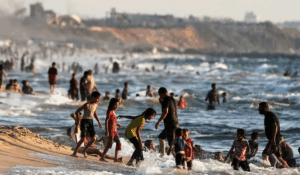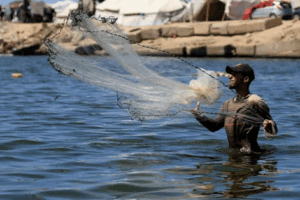IDF reiterates ban on Gazans entering the sea, last remaining source of relief for many Palestinians

Palestinians cooling off in the Mediterranean Sea amid high temperatures in Gaza City, early July 2025
Nagham Zbeedat reports in Haaretz on 13 July2025:
The Israeli military issued a reminder to Palestinians in Gaza that accessing the Mediterranean Sea along the Gaza Strip is forbidden – a rarely enforced restriction in place since the start of the war that will affect Palestinians who are already enduring acute water shortages, extreme summer heat and deteriorating humanitarian conditions in overcrowded tent camps.
The IDF’s Arabic-language spokesperson, Avichay Adraee, reiterated the restriction yesterday on X. “Strict security restrictions have been imposed in the maritime area adjacent to Gaza – entry to the sea is prohibited,” Adraee wrote. “This is a call to fishermen, swimmers and divers – refrain from entering the sea. Entering the beach and waters along the entire Gaza Strip endangers your lives.”
Adraee issued a similar warning in January during a cease-fire between the IDF and Hamas.
The policy was originally put in place on October 7, 2023 and has technically been in place since, although the Israeli army did not appear to enforce the ban against swimmers and bathers, only fishermen. The statement did not elaborate on the duration of the ban or the specific security concerns behind it, nor why the IDF is reiterating it now.
During the last 21 months of war, access to basic services and infrastructure has steadily eroded across Gaza amid Israel’s ongoing military campaign and restrictions on humanitarian aid. For many Gazans, the Mediterranean Sea served as one of the last remaining outlets for relief from the war, whether to cool off, bathe or fish for food. With temperatures routinely high, and with the territory’s drinking water network largely nonfunctional, the closure of Gaza’s shoreline has sparked deep frustration and despair.
“I’m literally dizzy from hunger, thirst and the heat,” said Rajaa Qudeih, a 31-year-old mother of two from Deir al-Balah. “Gaza is going through the worst famine, we haven’t eaten, and we can’t even find a piece of bread.”
Her family, like many others, has been sheltering in a makeshift camp near the beach. The sea, she explained, was their only reprieve. “The sea was the only outlet left. If they kill us for going there, maybe that would be easier than this slow death,” she said. “Still, I fear for my children. My oldest is nine. How can I convince him that swimming in the sea could get him killed?” She added, “We are camped by the sea. Where else can we go? Are they going to ban the air from us next?”
The United Nations estimates that over 90 percent of Gaza’s population is currently displaced, with many living in makeshift tents or crowded shelters with limited access to clean water or electricity. International organizations have repeatedly warned of a public health emergency due to dehydration, heatstroke and waterborne illnesses, especially among children and the elderly.
In the absence of functioning sanitation systems, some families had resorted to using the sea for bathing and cleaning. Others relied on it to supplement meager food supplies. Now, even that option is gone.

A fisherman throwing a net near Gaza City, after the Israeli military reiterated its ban on entering the sea, 12 July 2025
Anas al-Shareef, Al Jazeera’s Gaza correspondent, reported on his X account that residents were targeted on Sunday while waiting at a water distribution station. The Associated Press reported that six children had been killed, and the IDF said it had been targeting a militant but that a technical error made its munition fall “dozens of meters from the target.”
In a widely shared video on Facebook, a father is seen carrying the body of his son, who was killed while trying to get food for the family. Walking through the shattered streets, the man sobs as his surviving son trails behind, crying: “Why did you go out to bring water? Who told you that you should do it? We have been thirsty for three months, we don’t want water.”
According to the Coastal Municipalities Water Utility, which is responsible for water and sanitation services in the Gaza Strip, more than 95 percent of Gaza’s water supply is unfit for human consumption, and most desalination plants are no longer operational. Residents rely on expensive and inconsistent deliveries in bottles or water tankers. Both of these resources are often not available in the south, where the majority of displaced people have gathered in IDF-designated “safe zones.”
Fishermen, too, have been severely affected by the restrictions. Prior to the war, more than 6,000 people in Gaza – including 4,200 registered fishers and boat owners – earned their livelihood from fishing. According to UN data, more than 210 fishermen have been killed by the IDF since the war began.
Israel has frequently imposed maritime restrictions on Gaza over the years preceding the war, usually citing security reasons, such as preventing arms smuggling or attacks.
This article is reproduced in its entirety
